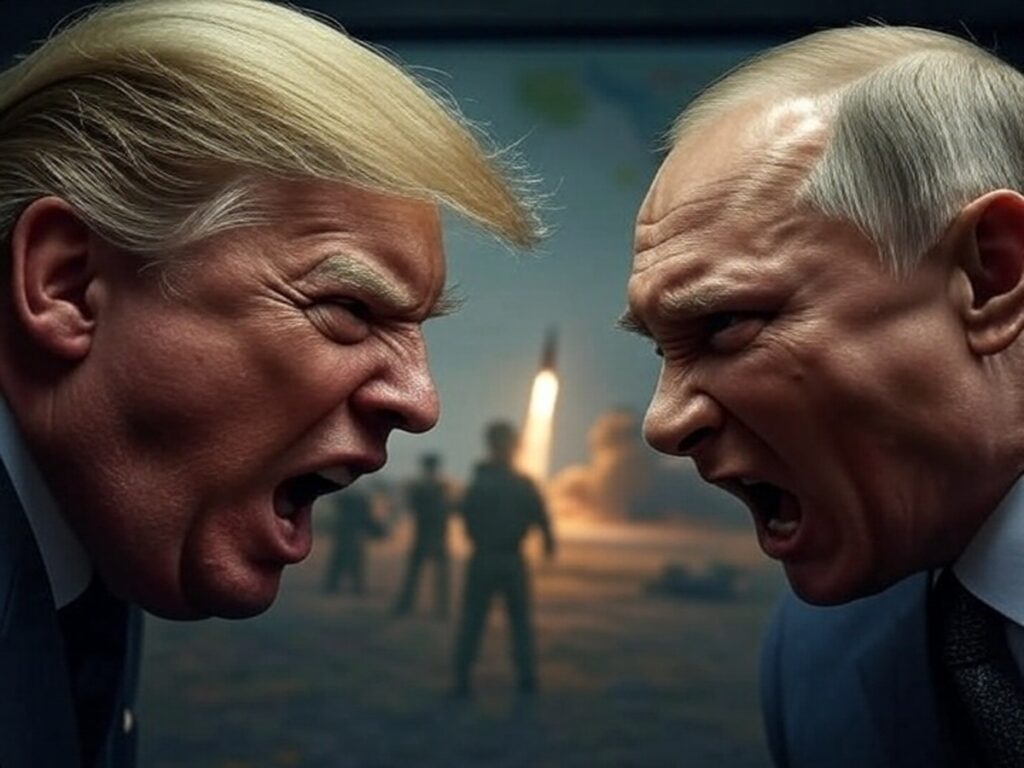Tensions Escalate as Medvedev Responds to U.S. President’s Criticism of Putin
New Delhi: Russia has issued a stark warning of a potential Third World War in response to U.S. President Donald Trump’s recent comments accusing Russian President Vladimir Putin of “playing with fire” amid escalating attacks on Ukraine. The sharp rebuke from Dmitry Medvedev, Deputy Chairman of Russia’s Security Council, underscores the deepening rift between the two nations as Trump pushes for a ceasefire that Putin has consistently rejected.
Trump’s Frustration with Putin Grows
Trump has been vocal about his dissatisfaction with Putin’s refusal to agree to a ceasefire in the Russia-Ukraine conflict, which intensified with a massive aerial assault on Ukrainian cities, including Kyiv, on May 25, 2025. In a statement to reporters, Trump expressed his frustration, saying, “I’ve known Putin for a long time, we’ve always had good relations, but now he’s launching rockets into cities, killing people. I don’t like it at all. We’re in the middle of talks, and he’s firing missiles on Kyiv and other cities. Something’s wrong.” On Truth Social, Trump called Putin “absolutely CRAZY,” warning that his pursuit of all of Ukraine could lead to Russia’s “downfall.”
Russia’s Defiant Response
Dmitry Medvedev hit back on May 28, 2025, stating, “Trump says Putin is playing with fire and that he could do something bad to Russia. I only know of one really bad thing—World War III. I hope Trump understands this.” The Kremlin, through spokesman Dmitry Peskov, earlier dismissed Trump’s remarks as a sign of “emotional overload,” while expressing gratitude for U.S. efforts in peace talks. However, Russia’s military actions—launching 355 drones and nine cruise missiles on Ukraine in the largest aerial attack of the war—signal no intention of backing down.
A History of Tensions and Failed Diplomacy
Trump has oscillated between praising Putin and condemning his actions. Despite claiming a good relationship, Trump’s patience has worn thin, especially after Putin ignored calls for a 30-day ceasefire. On May 20, 2025, a two-hour call between the leaders failed to yield progress, with Putin refusing to commit to immediate peace talks. European allies, including German Chancellor Friedrich Merz, have ramped up support for Ukraine, removing range limits on supplied arms, while Trump has hesitated to impose new sanctions, fearing it could derail negotiations. However, bipartisan U.S. senators, led by Lindsey Graham and Richard Blumenthal, have proposed sanctions if Russia doesn’t engage in good-fa personally to President Trump” for their help in organizing and launching this negotiation process.ith negotiations, reflecting growing frustration with Trump’s approach.
Global Implications and Public Sentiment
The escalating rhetoric has raised fears of a broader conflict. Medvedev’s mention of World War III echoes concerns among analysts that the Russia-Ukraine war, now in its third year, could draw in NATO powers if unchecked. On X, users have expressed alarm, with some calling Trump’s strategy “reckless” and others urging Putin to de-escalate. The conflict has already claimed thousands of lives, with Russia controlling 20% of Ukrainian territory, including Crimea, as of May 2025. Ukrainian President Volodymyr Zelenskyy has criticized global “silence,” urging stronger sanctions on Russia to curb its aggression.
A Fragile Path Forward
As Trump navigates this diplomatic tightrope, the world watches closely. His earlier threats of sanctions and tariffs on Russia have yielded little, and Putin’s resolve remains unshaken. With both leaders trading barbs and Russia intensifying its military campaign, the specter of a global conflict looms larger than ever, testing the limits of international diplomacy.


